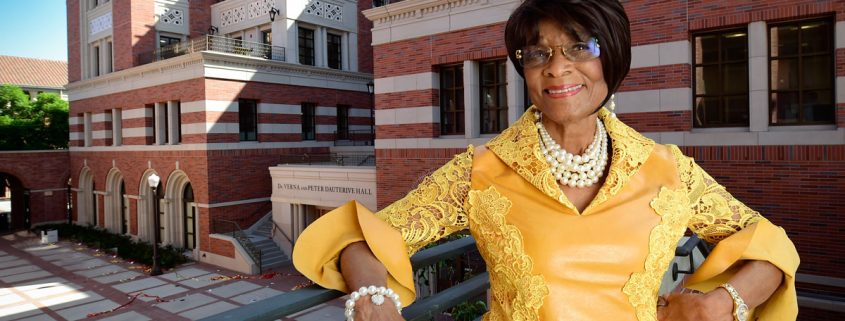USC Trustee Verna Dauterive leaves lasting legacy
Dr. Verna Dauterive, a long-time USC trustee, adjunct associate professor, donor and student will be remembered for her tireless efforts to improve education and its accessibility for African-Americans.
Dauterive passed away June 1 at the age of 93, and her name is recognized by many in the USC community as the namesake and donor for the $30 million Dr. Verna and Peter Dauterive Hall. Opened in 2014, it now stands as USC’s first interdisciplinary social sciences building.
But her mark on the University and the greater area began long before.
Dauterive worked for the Los Angeles Unified School District for 60 years, and when she was hired, she was the youngest teacher and one of just four African-American teachers in the Los Angeles district. In 1982, she became principal of Franklin Avenue Elementary School in Los Feliz, a post she would hold for 23 years.
In 1975, Dauterive played a major role in founding the USC Black Alumni Association, with husband Peter Dauterive acting as the organization’s first donor.
“She’s been able to do quite a bit in shaping opportunity for underrepresented students here at USC,” said Michèle G. Turner, the BAA executive director.
Born in 1922 in LeCompte, Louisiana, Dauterive received her bachelor’s degree from Texas Wiley College. After taking many weekend and night classes at USC, she received multiple degrees in education from the Rossier School of Education, including a master’s degree in 1949 and a doctorate in 1966.
Turner emphasized how Verna and Peter Dauterive created the Black Alumni Association because they felt there was a lack of student scholarships for minority students at USC.
“They used their own social capital to create awareness about that,” Turner said. “The first scholarships that were made available from the Black Alumni Association were largely done because of their own social network. Dr. Dauterive used that heavily to encourage other people to support underrepresented students here at USC.”
In 1985, the University endowed the Dr. Verna B. Dauterive and Peter W. Dauterive Scholarship as USC’s first scholarship for minority doctoral students in education. That same year, Dauterive was named an adjunct associate professor at Rossier.
“She made a mark on public education — first as a teacher and then as an administrator,” said Rossier Dean Karen Symms Gallagher.
Gallagher praised Dauterive for recognizing the importance of offering scholarships at the doctoral level.
“She recognized you have to reach a hand out to help the next generation,” Gallagher said. “She always stepped up and got things done.”
In 1995, Rossier recognized her with the Recognition of Outstanding Support for Education. Turner said that Dauterive was deeply admired by those who worked with her within the Los Angeles community.
“She has always been about people understanding each other better across culture, across races, across nations,” Turner said. “Her work touched across all boundaries. She was not someone limited by race, ever.”
In 2005, after a career spanning six decades, Dauterive retired. Three years later she was appointed as an honorary trustee for the Board of Trustees. She soon announced her $30 million gift to create the Dr. Verna and Peter Dauterive Hall in memory of her husband. It was the largest gift ever made by an African-American to a major institution of higher learning, according to the Los Angeles Sentinel.
Throughout her career, Dauterive supported the USC educational community by serving on the Board of Councilors at Rossier. She attended many USC related events, and founded the first alumni group, EDUCAR. Dauterive chaired the state’s Commission on Teacher Credentialing, appointed by the state’s Governor, as well as chaired the Commission on the Status of Women.
Dauterive also served on the board of the USC Alumni Association and was twice commended with its Alumni Service Award. In 2013, she received USC’s Presidential Medallion, the University’s top honor, which praises those who have brought distinction and honor to the University.
The Dauterives supported many programs and schools within USC. They made contributions to the Marshall School of Business, the Norris Comprehensive Cancer Center, the School of Dramatic Arts, the Price School of Public Policy, and USC Libraries.
In a 2014 Los Angeles Sentinel interview, Dauterive talked about how she sought to create more opportunities for all students with an impassioned approach.
“The great American dream, in my opinion, can be achieved and will be achieved only when all races of people, White and non-White, will approach this problem cooperatively, on the basis of mutual understanding, respect for human rights, and consideration for the dignity of the individual,” Dauterive said.

